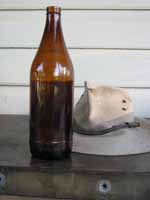A Charles Sturt University (CSU) led study has found many farm and fishing workers are heavy alcohol drinkers but are unaware of the potential health impacts.
The research involved surveys and in-depth interviews with more than 150 workers from seven regional centres in Victoria, Western Australia and NSW.
 Study participants worked in the grain, cotton, mixed farming, sugar and fishing industries. Interviews were conducted with casual, seasonal and mobile workers along with family members and employers.
Study participants worked in the grain, cotton, mixed farming, sugar and fishing industries. Interviews were conducted with casual, seasonal and mobile workers along with family members and employers.The research team included Adjunct Research Fellow at the CSU Centre for Inland Health, Dr Julaine Allan and Professor Patrick Ball from CSU’s School of Biomedical Sciences, along with researchers from Monash University and the National Drug and Alcohol Research Centre at the University of NSW.
Dr Allan said 43 per cent of those taking part in the study were identified as risky drinkers, who consumed large amounts of alcohol frequently.
”Around half of those in the study were drinking at risky levels, consuming five or six drinks every day putting them at risk of long term harm,” she said. “That figure would be even higher if you applied the National Health and Medical Research Council recommendation of no more than two standard drinks a day with two alcohol free days per week.
“High risk drinking was described as part of rural culture, expected of men in particular. Many participants felt if they were able to go to work the next morning then they hadn’t drunk too much the night before.
“Long term excessive alcohol consumption can lead to chronic health conditions including cardio-vascular disease, liver disease and cancers of the digestive system, while at a more pragmatic level it makes people overweight and bad-tempered,” Dr Allan said.
She said many of the research participants were unaware of the health impacts, although they were aware of health messages around limiting daily consumption.
“The most significant impact of drinking reported by participants was the potential for the loss of their driver’s licence. There were few examples of interpersonal violence or injury as a result of drinking,” she said.
The study also found very limited use of health care among those surveyed and no knowledge of drug and alcohol services.
Dr Allan hopes this research can be used to develop an online resource to help people in rural and remote areas.
“The research demonstrated a need for action on high risk alcohol use but also that action will be resisted because drinking is so much a part of rural culture and social life.
“People don’t want to talk about their alcohol consumption to healthcare providers or their mates and they don’t want to stop the social events and community get-togethers that revolve around alcohol.
“Online information and interventions to reduce alcohol consumption that can be delivered via mobile phones and industry-based websites are a private yet effective strategy to reduce alcohol consumption at times that suit work schedules and personal needs,” she said.
The research project has been funded by the Collaborative Partnership for Farming and Fishing Health and Safety, a collaboration of the Cotton, Fisheries, Grains and Sugar Research and Development Corporations and managed by the Rural Industries Research and Development Corporation.
People concerned about their own or another’s drinking can look up alcohol in the front of the telephone book or contact your local health service for advice and assistance.
The study, Drug and Alcohol Use By Farm and Fishing Workers can be found here.





Social
Explore the world of social